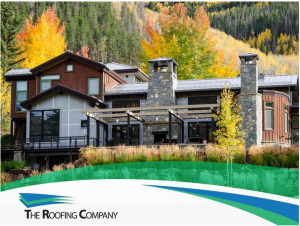It is easy to get excited about a metal roof. Many companies advertise metal roofs as “the last roof you’ll ever need.” However, many homeowners don’t read the fine print or take into account that metal roofs are not ideal for every home.

Here a few pros and cons of a metal roof installation.
Metal Roofing: Pros
When correctly engineered, installed by a professional roofer and maintained regularly, the life of a metal roof can last upwards of 60 years. These types of roofs also have incredible resistance to ultraviolet (UV) rays, fire, mildew, rot and high winds. Most metal roofs come pre-painted with a 45-year paint warranty. The paint provides additional protection for your roof. Metal roofing can also reflect radiant heat from the sun, keeping your home cooler in the summer and lowering your electric and gas bills by up to 20%.
Shingle colors are greatly limited by the manufacturer’s ability to create different color options. This limitation generally has no effect on metal roofing. In fact, many metal companies provide large lists of around 40 to 50 color options while also having the ability to produce just about any custom colors at additional costs.
Initial Costs
The largest drawback that turns homeowners away from metal roofing is the initial cost. Metal roofs can be anywhere from two to four times the price of asphalt shingles. Sheet metal requires specialized tools and knowledge that can drive up the cost of labor. Many jobs require on-site fabrication rather than picking up a truckload of ready-to-go shingles from a yard.
Winter Conditions
Without a properly engineered snow retention system, metal roofs run a higher risk of runaway of sliding ice and snow. Snow and ice gain great momentum over metal surfaces. The damage generally occurs in areas of intersecting roof planes, such as valleys. The crush can leave roofs exposed in areas where high volumes of water collect and funnel.
Damage can go unnoticed and require costly fixes. Sliding ice and snow also creates hazards to pedestrians below. High-grade snow retention has become a necessity in high-traffic locations and a requirement on most commercial roofing projects. This can cost an additional 25% to 60% of the total cost of the metal roof alone.
Metal expands and contracts as the temperature rises and drops throughout the day. Metal roofs, especially roofs with exposed fasteners, require periodic constant roof maintenance services as this continual expansion and contraction can loosen screws and shift material over time, exposing the roof to unwanted moisture.
Repairs
Metal roofs may require entire sections of the roof to be replaced to repair versus only replacing a select area of shingles where the damage is located. It’s primarily for this reason why metal roof repairs tend to be more expensive.
Oil Canning
Also known as “stress wrinkling,” oil canning is a visible wavy appearance in the metal. Though it does not affect the overall performance of the roofing system, oil canning can look bad aesthetically.
There are many factors that contribute to oil canning: temperature, uneven roof sheathing or insulation, panel length, roll forming, metal gauge and so on. This problem can be minimized by including striations in the panel, increasing the gauge of the metal and choosing a roofing panel with a more structured profile.
Drainage
Water tends to shed off metal roofs much faster than asphalt roofs. To protect entryways and high-traffic areas, consider the cost of additional gutters and downspouts to catch the increased flow.
The Roofing Company is the roofing contractor that leads the state in providing metal roofing assemblies. Give us a call at (970) 887-0104, or fill out our online contact form. We serve clients in Granby, CO.
